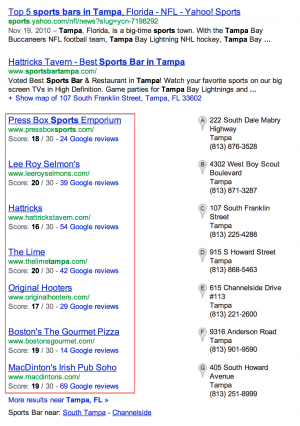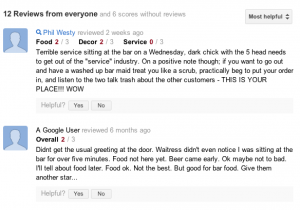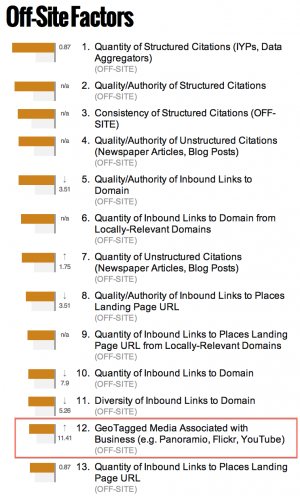How Social Signals Could Potentially Influence Local Search Results
For a local business, localized search results are lifeblood to them. Focusing on a local SEO strategy can often have a bigger impact on their business model than focusing on the full organic results. A lot of smaller local businesses aren’t blessed with an extremely large marketing budget and could have potentially resorted to tactics […]
For a local business, localized search results are lifeblood to them. Focusing on a local SEO strategy can often have a bigger impact on their business model than focusing on the full organic results.
A lot of smaller local businesses aren’t blessed with an extremely large marketing budget and could have potentially resorted to tactics that caught them up in the Penguin filter. There are ways to take advantage of the local space without spending an extraordinary amount of money, while leveraging your social community at the same time.
When Google+ integrated local places in May and started taking advantage of the Zagat scoring system for restaurants, I naturally had questions as to how much of an impact social check-ins and geo-social signals could affect local results if we went a step further from reviews in the restaurant category and otherwise.
With Google Local pulling in review links from third party sources, it seems like a natural step to integrate links from third party platforms, such as FourSquare and Facebook Places, where on-the-fly check-ins and reviews occur.
In search, there’s a tendency to “hop on things when they’re working” and then stick with them even if they’re not working anymore. It’s very hard to get on board with forward thinking that involves speculation, even if it that speculation seems like the natural direction local search is heading.
If you’re a business that can take advantage of social media locally, what steps can you take to prepare yourself for if and when check-ins and geo-social factors become a more prevalent signal in the local algorithm?
A Snapshot Of Local Search Signals
Currently, you have an influx of local signals combined with the traditional signals like age, domain authority, backlink portfolio diversification, etc.
Here’s a very small and quick breeze through of some factors (certainly not in its entirety):
- Location of the searcher
- Geo-modification of the query vs. generic queries (IE: Tampa optometrist vs. Optometrist)
- Local reviews
- Citations (Consistant NAP- name, address, phone number)
- Links (geo-modified phrases, generic phrases, branded phrases or links from local sites with local content)
- Category classification (Broad vs. Narrow)
- Proximity to the center of the geo-location
- Sentiment of reviews (influences new “score” system)
- Reviews (which are also linking to third party reviews such as Yelp)
- Media integration (photos, videos, etc)
- Query intention (Brick and mortar vs. services based companies)
Now, you have the above (and all of the other local ranking factors) tying into the addition of the Zagat/total 30-point scoring system from Google’s purchase of Zagat last year and Google+ information for existing pages.
The screenshot below shows the new scoring system that’s integrating into the SERPs from the addition of the local tab:
The scoring system appears to use a form of sentiment monitoring to assign individual scores to reviews, then takes those individuals and averages them into a total score.
As many have pointed out already, the Zagat score or a regular total score appears in the local pages for certain restaurants:
Where Does Social Come Into Play?
I know. Everyone, everywhere is talking about the importance of social media.
And I’m going to talk about it too, not because it’s an overwhelmingly strong signal in the local space currently, but because I think over the course of the next few months to a year, the geo-social and check-in information will have a large effect on how businesses are ranking in the local space with the migration of places into the Google+ platform.
Businesses will have to consider the following:
- Does social media fall into your business model?
- Can you leverage social to reach your local consumer base?
- Is the physical location tied to your places/local page an actual location where check-ins could be encouraged? This falls into brick and mortar vs. services based shops.
- Is it feasible to encourage check-ins at your physical location?
- Can you hold check-in based events at your location?
If you’re able to do the above with your location and business model in a category where it’s expected – salons, restaurants, local movie theaters, bars, hotels, etc. – then you can have very strong geo-indicators from physical customers if and when these signals begin to influence the algorithm in the future.
Mobile Application Use
There was a Comscore study in early 2011 that says approximately 16.1 million US subscribers (7.1%) of the entire mobile population uses their device for checking into a location.
One of the biggest facets of search is understanding user behavior, even if it doesn’t appear to be strongly correlated to ranking factors right now.
With the use of mobile phones and checking in to locations becoming more prevalent, there’s a strong potential to use signals from geo-location services offered through FourSquare, Facebook and other geo-social networks to signify the importance and relevance to a particular location that already has existing and consistent citations and links.
With the updated local search ranking factors document released on June 11th, it makes mention that the importance of geo-tagged media (images, videos, etc) tied to a local business has increased.
When you look at the other factors related to social check-in frequency and velocity, they don’t appear to have a strong correlation or importance for local rankings… yet.
Many events are starting to use QR codes as means for checking in automatically on Facebook, and if you’re holding an event, spending time with your physical community and getting check-ins from attendees, it would make sense to tie that in as a stronger local signal.
I’m well aware that this is an extremely unfeasible situation- so please note that the following example is based on a speculation-based scenario.
If you have two sites that are exactly the same metrics wise, proximity wise to the center of the geo, and all other things are identical, which site do you think should eventually have a higher ranking from local signals? Would it be site A, or would it be Site B with local check-ins?
Site A
- Citations/links from traditional directories
- Mixture of non-geo modified and geo-modified links from other local businesses or websites
- Google+ Local information correctly reflects existing business information listings
- Reviews
- Geo-tagged videos and images
Site B
- Citations/links from traditional directories
- Mixture of non-geo modified and geo-modified links from other local businesses or websites
- Google+ Local information correctly reflects existing business information listings
- Reviews
- Check-in information from Facebook/Gowalla, FourSquare, etc. accompanied by positive and/or negative reviews.
- Geo-tagged videos and images
- Geo-tagged tweets or geo-tagged (public) Facebook updates.
There are always factors that can be manipulated when it comes to “proving” your business exists at an actual address, but if you’re corroborating social check-ins and reviews, traditional reviews (Google local/places, Yelp, FourSquare, etc), geo-modified and generic links, citations and content/links from sites that also have local signals, the chances that you’re actually operating locally and deserve the votes you’re getting becomes a stronger signal.
Since these would need to be weighed on a categorical basis (some categories/industries would have a hard time encouraging or gaining check-ins) I think it would establish which verticals and local business categories are hyper-competitive in regards to leveraging social media with their physical community.
How Do I Take Advantage of Social?
There are many by-products of using social media and you have to understand what strategies generate which kind of returns.
There’s social media strategies for brand awareness, expanding customer base online and mobilization of contests and product launches, and then there’s social media as it relates to organic search.
Taking advantage of social media for organic search requires thinking a little outside of the box with regards to what’s working now, and considering how your usage and customer base could add influence to your rankings in the future.
Direct Connect & Business Information
If you’re on Google Plus, get direct connect implemented into your website so it’s tied to your Google Plus page.
This part is common sense, but it’s easy to overlook adding and changing details for your business on your local page. Make sure that you’re keeping all details up to date and filling in everything appropriately, from category, to description, to business name.
List Social Profile Info In Physical Location
A lot of people forget this because a typical customer won’t visit your social profile page when they’re in the store. The fact that you’re active on social and potentially offering discounts or information on there could encourage them to check back with the brand when they’re on a computer.
If you’re in a brick and mortar location that allows walk-ins, it’s the perfect opportunity to display your social profile information (especially Google + and the option to leave a review) to encourage customers to visit your page.
Check-in Discounts
If you’re a brick and mortar business with a walk-in location, offer incentives for check-ins. The biggest type of discount here is a product discount but the incentive will vary depending on your business.
If you’re a services-based location with no physical assets, offer discounts on services with special codes/QR codes in the store.
Reviews
Reviews are an important factor for local, and should be encouraged. The majority of “average” users didn’t realize that they could leave reviews on Google Places pages (unless that’s how they found your business).
Encourage reviews both online and offline. It’s okay to solicit and encourage feedback and reviews about your service without explicitly asking for “good” feedback. With a review strategy, it’s possible you’ll receive a bad review here and there and it’s something you have to be okay with.
Holding Local Events
This isn’t something that all local businesses can do, but if it fits into your business model, try holding events at your location where check-ins are encouraged.
- “Team” check-ins- encouraging customers to bring a group of friends with them and check-ing in with a comment that contains their ‘team’ name. Give discounts to those who have the largest group.
- If you have a Flickr page, encourage customers to grab media and contribute them to an event set.
- Aggregate your own media during the events and upload them into your relevant channels.
- Don’t only go after the big guys – build relationships with local online publications that can share or review your event.
Virtual Loyalty Card
The loyalty card has long been offered to reward those who are frequent and loyal shoppers. Taking the idea of a virtual loyalty card and translating it into rewarding those who check-in often can help encourage further engagement from the community. The mayorship is already out there, but building up a team of elite consumers is an option that isn’t as competitive and makes everyone feel rewarded.
Think “Yelp Elite Squad“. What Yelp does is reward those that are giving honest, personable and useful reviews to the community for places that they’re been to. In return, there’s the ability for users to become a Yelp Elite and participate in fun/free events and outings with a chance for some swag or taste testing.
If you can offer something, as a business, for those who are loyal to you, then you could generate buzz around all of your local events.
- What can you offer that’s of benefit to frequent customers?
- Can you translate the idea of a “loyalty card” with discounts to “loyalty check-ins”?
- What’s the barrier to entry for becoming an elite consumer?
- Once you achieve that, can you reward your elite consumers by throwing special events or discount days specifically for that group to encourage further check-ins and engagement?
Small Social Barriers
Social media is free but it doesn’t mean your customers should earn the right to special discounts without working towards it.
Create a small barrier for users to encourage them to add your brand to their Google+ circles. As an example, there’s the potential to advertise a Google+ Hangout where you’re educating, demonstrating or simply sharing something through the hangout, and closing it with a special discount for those who participate.
Social media should provide free value for your consumers, but it doesn’t hurt to make them work a little for a special discount or bonus- having these “loyalty” hangouts or whatever medium you choose can make them feel as if it’s an elite incentive just for them.
Offer & Produce Localized Content
If you’re planning on becoming a resource locally to your customers, having localized content on your website or blog not only provides information to your existing customer base, but it further cements the locality of your website and business when shared socially.
There’s also the option to produce local content which can open the door to promoting social media events or discounts in the future.
Even though there are still some social signals that aren’t fully ingrained in the local ranking algorithm (or at least, haven’t been detectable) it’s still something to take advantage of if you have the manpower, capacity and physical location to promote community, social events and check-ins.
I’m a big believer in looking ahead in search to see what distant factors might turn into large ranking factors and while correlation doesn’t always equal causation, it never hurts to get your foot wet. I think merging Google+ and Places to create Google+ Local is definitely a step in the direction of utilizing geo-social signals as a more substantial factor.
Contributing authors are invited to create content for Search Engine Land and are chosen for their expertise and contribution to the search community. Our contributors work under the oversight of the editorial staff and contributions are checked for quality and relevance to our readers. The opinions they express are their own.
Related stories




